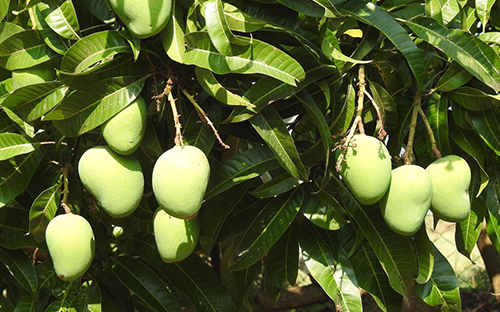Our effort is to bring you closer to nature and give you a quick look at our farm through regular updates on what’s happening at the farm and how we take care of it. We hope this will give you an actual insight on our organic methods and the quality of fruits that we bring to you, right from our farms. We are passionate about truly natural and honestly organic ways of growing our plants and fruits, right from the seed stage to a fully ripe fruit.

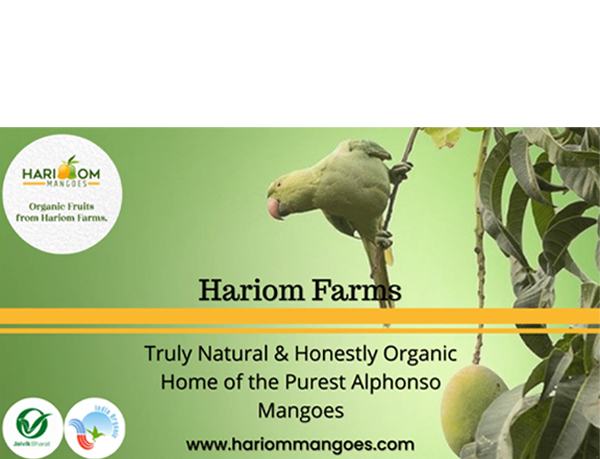
The founder and brain behind Hari Om Farms is Abhimanyu Kale, a certified organic farmer who had studied organic agriculture in the 1990s. Kale had grown up with stories shared by his grandfather about the family's ancestral orchard in Shinoli village in Ambegaon tehsil of Maharashtra. This orchard, nurtured by the senior Kale's maternal uncle who had worked with traders and wholesalers from Mumbai's Crawford Market, flourished with mango varieties from the Valsad and Ratnagiri, brought over specially.
When the orchard took life in the early 1920s, invitations were sent out to over 100 villages to bring in animal carcasses as a landfill, an excellent natural fertiliser for the soil!
Inspired by the way organic means were employed to grow the Shinoli orchard, Abhimanyu Kale decided to go the organic way himself in 2003. Plantation of mangoes was inspired by his grandfather's success with the fruit, and custard apples which were a personal favourite and do not require much care also found pride of place in the new orchard at Pimpalgaon in Junnar district.

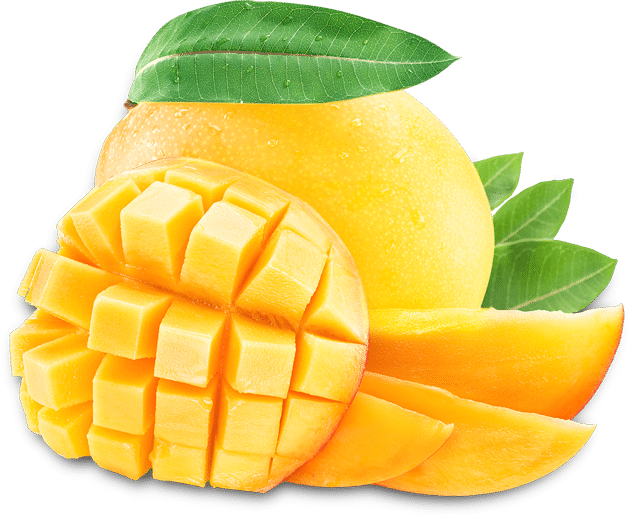
Back in 2003, when Hari Om Farms was just a vision, there were many sceptics who believed organic agriculture could not succeed. But Kale, who had worked in the field of organic farming in the 1990s, knew the idea was waiting to be born. ``Back in the 90s, the concept of bottled water was looked upon as an unnecessary luxury. Today, we cannot dream of stepping out without bottled water. It's the same story with organic foods. I knew that within 15 years, shops would start stocking organic foods and the demand would go up substantially,`` he says.
It was an intuition, backed by experience, which has paid off. Hari Om Farms is today one of the few orchards in the state to have a completely organic process of cultivating and ripening the fruit. While any farm growing pulses or vegetables can go organic in 3 years, fruit orchards take much longer for the soil to absorb the natural nutrients and pass on the natural goodness to the fruit. Hari Om Farms has thus a nearly 2-decade long edge over orchards that are just beginning to turn to organic farming!
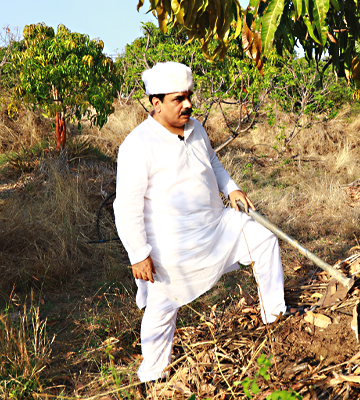
Kale believes that organic is the way to go if we want to continue to thrive on this planet. The Green Revolution of the 1960s brought with it a wave of chemical farming to the country. Over the decades, the health of farming soil has deteriorated and no amount of chemical fertilizers can give the same yield any longer. The reason is simple - loss of organic carbon from the soil!
To give a simple analogy, the best nutrition for a child is the mother's milk, no external nutrition can even come close to natural nourishment. Organic farming follows the same principle - the soil needs to be nourished naturally for the harvest to grow healthy and strong!

Ironically in Marathi, the same word 'pikavani' is used for both - fruit ripened organically or plucked and then ripened separately. Any orchard that promises you organic fruit may not necessarily have cultivated as well as ripened the fruit in an organic manner. It's very important to satisfy yourself whether the mango or custard apple you are buying has been merely grown organically or ripened organically, or both!
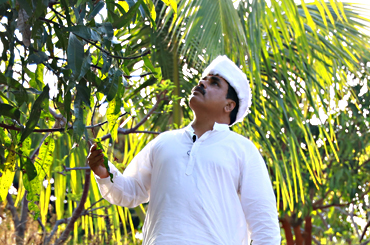
Hari Om Farms is located in Pimpalgaon in Ambegaon tehsil of Junnar district in Maharashtra, 40 kms from Bhimashankar, at a distance of 80 kms from Pune and 200 kms from Mumbai!
The Alphonso mangoes that have been planted in this orchard have been brought by pioneering wholesalers and traders from the Mumbai markets who decided to innovate by taking the Alphonso away from its original geography. The Alphonso has not just flourished in its new habitat but has taken on an enhanced flavour and quality from the climate and soil of Ambegaon! The region lies in the transition zone between two agro-climatic zones that have high rainfall and is rich in laterite soil that is just perfect for the Alphonso. The orchard is located within the Deccan Trap, which has been known for centuries for bearing the best Alphonso and for giving it the deep saffron colour and perfect piquant taste that rightly makes it the king of all fruit!
In fact, this lucky combination of the natural condition of weather and soil, added with the organic goodness of natural cultivation and ripening, makes the Alphonso from this cluster of villages one of the prized mangoes in the state and commands a higher price than its counterparts in other regions.

The Konkan Alphonso mango enters the markets by May every year. Farmers in Junnar who have stopped using the CULTAR technique and prefer the organic cultivation and ripening way, harvest their mangoes a month or so later. The Junnar mango enters the market by June, once the Konkan mango is on the way out. The Junnar mango is grown without any chemical help, ripens naturally and is richer in taste. It's worth the wait!
